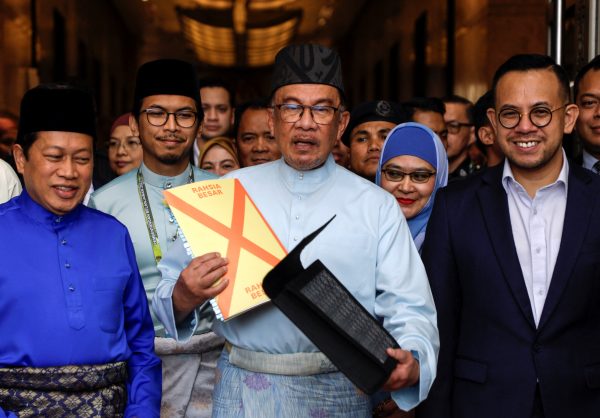In contrast to the October 2023 budget, the supply bill emphasises boosting Malaysia’s globally competitive industries — specifically manufacturing, halal goods and services, Islamic finance and foreign investment. Foreign investment is expected to receive additional support as Malaysia implements the Comprehensive and Progressive Trans-Pacific Partnership Agreement and its New Industrial Master Plan.
But the budget’s design also points to serious roadblocks in achieving further fiscal reform.
Contradictory policies undercut the budget’s goal of keeping expenditures in check without sacrificing socioeconomic justice and citizen welfare. Setting aside the absence of progressive tax policies, the decision to purchase electric vehicles (EVs) for federal government use is an example of this.
The 2024 budget does not clarify the cost of this initiative. But the cheapest EV in Malaysia costs RM140,000 (US$30,000), whereas Malaysia’s Department of Statistics estimates the median monthly salary of Malaysians to be RM2600 (US$550). If the intention is to model Putrajaya as ‘Malaysia’s low-carbon city’ and promote EV use, this is not a feasible goal, particularly against a backdrop of inflation fears and slow wage growth.
Questions arise as to whether overhauling Putrajaya’s automotive fleet is a financially prudent means of implementing a green transition, given the 2024 budget’s emphasis on fiscal consolidation, subsidy rationalisation and a reduction of RM9 billion (US$1.97 billion) in development spending compared to the 2023 budget .
Unchecked contradictory policies and messaging may not only increase operating expenditures but also undermine the widespread buy-in needed for successful long-term fiscal reforms. Alternative policies — such as expediting the implementation of the shelved carbon tax — that would fulfil the twin goals of sustainability and fiscal consolidation, should be more strongly considered.
Meanwhile, electoral cycles and political considerations constrain reform ambitions. Emoluments and retirement payments for civil servants and pensioners — a significant voter base — constitute 42 per cent of the RM394 billion (US$84 billion) budget. If these dues were smaller, there would be less borrowing to compensate for the 2023 fiscal deficit of RM86.2 billion (US$18.4 billion) and finance development spending.
The government expects emolument and pension costs to rise further. Tightened spending on these fronts is necessary for effective fiscal consolidation. But Malaysia’s August 2023 state elections show the Anwar government losing ground, particularly in Malay-majority seats, due to greater ethno-religious polarisation and weaker grassroots machinery. Vote banks — such as the civil service — may be more crucial than ever going forward. Plans for pension restructuring will be weighed against the risk of further diminishing electoral and popular support.
Systemic government presence in Malaysia’s economy also obstructs significant gains in expenditure and debt reduction. In the budget’s section on the Bumiputera agenda, Anwar warned government-linked investment companies and government-linked companies (GLCs) against repeating ‘past mismanagement’ and incurring further losses to the government and taxpayers.
Yet this attempt to shore up Malay support undermines fiscal consolidation goals. Blaming company mismanagement masks poor government decisions to sustain political patronage, such as through lax punishments for failed projects, exorbitant procurement costs and general government interference in market affairs for political purposes.
For instance, the government provided a RM300 million (US$63.9 million) liquidity injection to the Armed Forces Fund Board (LTAT) and guaranteed it RM2 billion (US$426.2 million) after a deal to sell a financially troubled subsidiary — Boustead Plantations — fell through.
LTAT has kept silent on the reason for the aborted acquisition, which was cancelled at the eleventh hour. It followed on the heels of an extensive parliamentary debate on the sale of Bumiputera assets and plans ‘to save LTAT’ announced by Anwar before a Federal Land Development Authority audience — a well-known Malay vote bank — suggesting higher powers possibly intervened in favour of an indirect bailout to pander to Bumiputera interests despite poor returns to taxpayers.
The money promised is in addition to the RM2.1 billion (US$447.5 million) in cost overruns awarded to LTAT’s Boustead Naval Shipyards (BNS), contracted to deliver six — now five — combat ships for RM9 billion (US$1.97 billion) and the yet to be announced price tag of the BNS government takeover.
Meaningful fiscal consolidation necessitates going beyond admonishing GLCs. It requires advancing GLC reforms to reduce systemic political interference that constrains growth and impedes a healthy level of market governance. This includes expediting the Government Procurement Act slated for tabling in 2024, which should cover inefficient GLCs and public–private partnerships on top of government ministries and agencies, and resuscitating efforts to remove political appointments to GLCs and federal statutory body boards.
What serves the country, however, is also disadvantageous to the ruling party. GLCs dominate Malaysia’s economy — access, control and the general ability to interfere in their dealings are politically invaluable. Substantive reform on this front will remove significant leverage.
The commendable first steps taken in the 2024 budget reflect Malaysia’s commitment to more prudent fiscal management. It would be remiss, however, to assume that reforms will be smooth sailing given the Anwar administration’s need to balance between fiscal strengthening and political survival. The pressure to be consistent in reform policies and messaging, while also keeping a grip on popular political support and leverage, highlight the long road to fiscal consolidation.
Amalina Anuar is an independent research analyst based in Malaysia.

